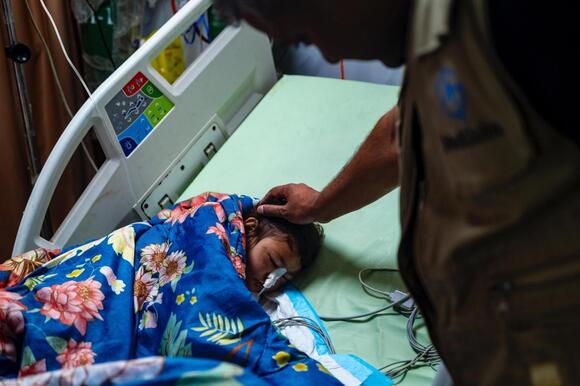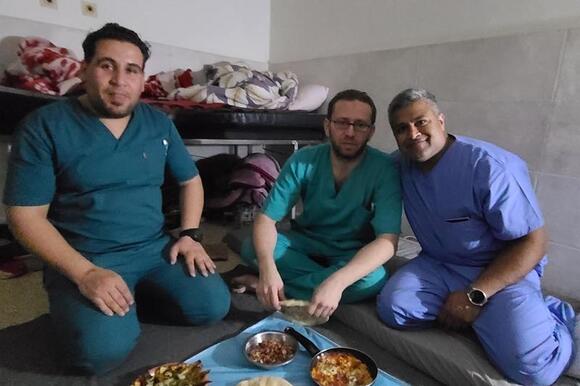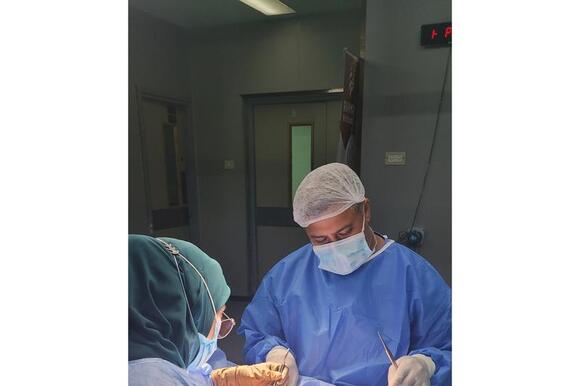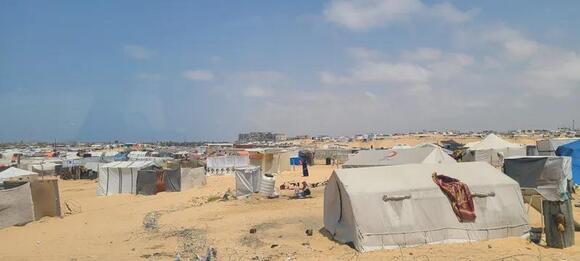
NEW YORK (1010 WINS/WCBS 880) – Struck by the scents of infected wounds mingling with food prepared by patients’ families, Dr. Syed Sayeed walked into the European Gaza Hospital, located between Rafah and Khan Younis in southern Gaza.
“It was emotional, but there was also a sense of urgency that I needed to get to work,” Dr. Sayeed told WCBS 880.
Born in the Bronx, Dr. Sayeed, a plastic surgeon on Long Island, chose to volunteer with MedGlobal , a non-governmental organization, to provide urgent medical care amidst Israel’s ongoing bombardment of Gaza following Hamas' Oct. 7 terror attack.
On April 16, Dr. Sayeed arrived at the European Gaza Hospital, the largest hospital still operating in southern Gaza. Initially founded by the UNRWA with a grant from the European Union in 1989, the hospital is designed for 250 patients. However, it was overflowing and had to accommodate over 1,000 people, Dr. Sayeed explained. During his time there, he spent his days operating on patients of all ages, from babies to the elderly.
Dr. Syed Sayeed, a plastic surgeon from Long Island, strokes the head of a child patient during a volunteer trip to Gaza in April 2024. Photo credit Tom Lewendon “I didn’t go with any expectations because I didn’t know what I would encounter there,” Dr. Sayeed said. “What struck me the most was the level of devastation.”
One patient, a three-year-old girl named Hala, was brought in on Dr. Sayeed’s second day with burns covering over 30 percent of her body. She suffered these burns after falling into a pot that was being used for cooking near her family's makeshift tent.
In addition to burn patients from the bombing of the region, household accidents were common due to the dense population and lack of resources. “The children were always running around because now they don’t have a home. Hala was sustaining these very large, severe burns, especially as a very small child.”
She was brought to the hospital and stabilized. Determined to give Hala the best chance at survival, Dr. Sayeed extended his stay. “So I called home and said, I need to stay here longer than the two weeks because I think I can do my best and try to help her, at least get her stabilized and some skin grafts adherent. And hopefully, she’ll survive.”
Despite his efforts, Hala died from sepsis.
“Obviously, life and death is not in our hands, but we can do our best in terms of providing care,” Dr. Sayeed said. “Every day, we were not just fighting against injuries but also against the lack of resources that makes recovery so difficult here.”
Dr. Sayeed worked alongside a dedicated local team, including a surgeon who had one year of general surgery experience and a few months of plastic surgery experience from NGOs and medical students who wore black coats labeled “Warfare Plastic Surgery.” He shared a room with three displaced surgeons, working shifts of more than 10 hours per day.
“They were extremely devoted to what they were doing and willing to learn anything and take care of patients without hesitation,” Dr. Sayeed said. “We ate, slept, and stayed up at night in that room. We would sit around talking at night about what was going on. We’d all pray together in the hallway, then get a little sleep before heading back to the hospital.”
 Dr. Syed Sayeed, a plastic surgeon from Long Island, poses with fellow doctors during a volunteer trip to Gaza in April 2024. The gentleman immediately next to him is a surgeon, and the one to the far left is an operating room nurse Photo credit MedGlobal
Dr. Syed Sayeed, a plastic surgeon from Long Island, poses with fellow doctors during a volunteer trip to Gaza in April 2024. The gentleman immediately next to him is a surgeon, and the one to the far left is an operating room nurse Photo credit MedGlobal Reflecting on the nightly conversations within the team, Dr. Sayeed said, “It was a way to process what we were experiencing and support each other. They talked about how they were displaced and their concerns about their families.”
The personal stakes were high for many of the local doctors, who, despite having elderly family members and the means to evacuate by paying $5,000 to the Egyptian side , chose to stay. They were deeply concerned about their well-being but felt a strong obligation to remain in Gaza.
Doctors displaced, from European Gaza Hospital to Al Aqsa’s emergency room
About a week and a half into his stay at the European Gaza Hospital, Dr. Sayeed himself faced displacement due to security concerns, necessitating his evacuation. He was the only MedGlobal volunteer assigned to the European Gaza hospital, and he was moved to Al Aqsa Hospital to be with the rest of the team in case of a complete evacuation.
He experienced the emergency room at Al Aqsa Hospital, where many patients injured by bombings in the north were being brought in acutely. Multiple ambulances would bring patients in and place them on the floor because there was nowhere else to put them, he described.
The emergency room was a chaotic scene, with blood on the floor, people screaming and kids crying, Dr. Sayeed shared. “Children would sit there completely in shock, covered head to toe in dust. They wouldn’t be speaking because they experienced something so devastating, something so loud, something so destructive.”
One particularly haunting memory was of a child who came in after a building collapse. “She probably had some level of oxygen deprivation because she was crushed. She did not say a word for hours and just had a blank stare on her face,” he said.
Dr. Sayeed was later reassigned to a primary health care clinic near the Egyptian border. With everyone concentrated in one area, more accidents were increasing, leading to injuries such as children having their feet run over by cars, shrapnel injuries and various lacerations.
 Dr. Syed Sayeed, a plastic surgeon from Long Island, operating on a patient during a volunteer trip to Gaza in April 2024. Photo credit MedGlobal
Dr. Syed Sayeed, a plastic surgeon from Long Island, operating on a patient during a volunteer trip to Gaza in April 2024. Photo credit MedGlobal At the clinic, he also experienced the malnutrition clinic, dental clinic, and the ophthalmology clinic. The destruction of infrastructure, not just hospitals but the entire health care system from north to south, made their work even more critical, Dr. Sayeed explained.
During the interview, Dr. Sayeed passionately spoke about the emotional strength and resilience of the people in Gaza.
“I would imagine that a place with such devastation would have signs of depression and hopelessness all around,” he said. “This was absolutely not the case in Gaza. The resiliency that they have is something that’s in their blood, something that they’ve developed over decades of being occupied.”
He acknowledged that moments of despair do occur, especially when family members of residents and hospital workers die in bombings, but said that the despair is often channeled into crying out to their creator.
 Tents set up in Gaza in April 2024. Photo credit MedGlobal
Tents set up in Gaza in April 2024. Photo credit MedGlobal Dr. Sayeed’s journey ended on May 1 when he returned to John F. Kennedy Airport. Now, he is back in his clinic in Manhasset, where it is clean and quiet, with no drones.
For future volunteers, he spoke about the importance of advocacy. “While there are scarce opportunities,” he said, “people in the U.S. either have their eyes open and are ignoring the atrocities, are looking at these atrocities and supporting them, or they just don’t care. So spending a lot of effort on advocacy for the people of Gaza is the most important thing now.”
The conflict, which has claimed over 35,000 lives according to the Hamas-run Gaza Health Ministry, began after Hamas’ Oct. 7 terror attack in southern Israel resulting in nearly 1,200 deaths in Israel and around 220 people being taken hostage. About 130 hostages remain in Gaza, with a quarter of them believed to be dead. The Gazan death toll includes deaths recorded in hospitals, reports from family members, and media reports, according to the BBC.
Since Dr. Sayeed’s safe return, the World Health Organization reported that it has been unable to deliver medical aid to Gaza since May 6. “We have hospitals under evacuation order,” WHO spokesperson Tarik Jasarevic, said during a UN press briefing last week. “We have a situation where we cannot move physically.” This statement follows Israel’s claim at the ICJ that it had been facilitating the entry of aid into Gaza.
 Most Popular
Most Popular




Comments / 0